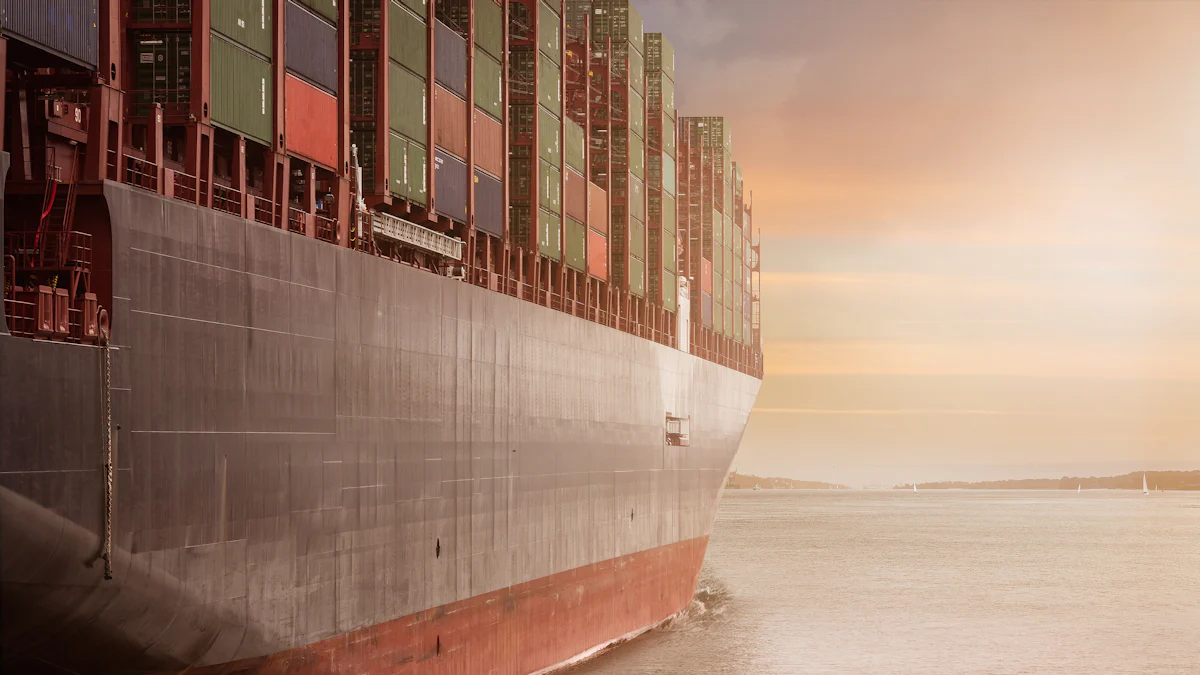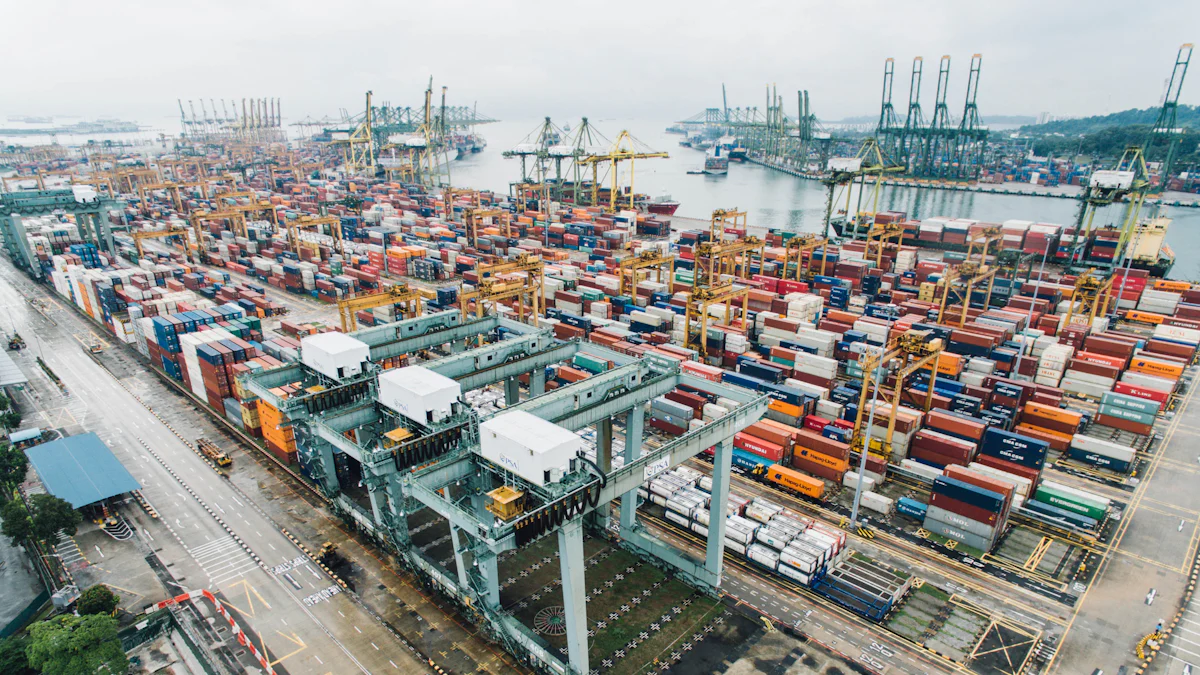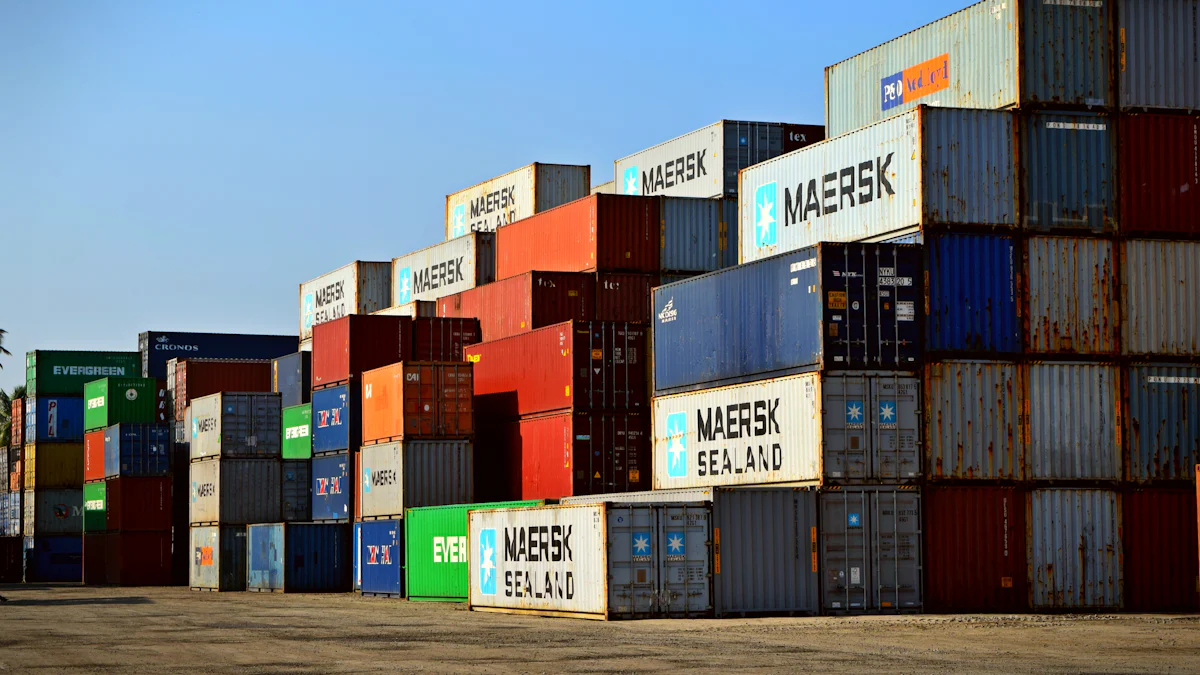Overcoming Overseas Warehousing Challenges in Cross-Border Logistics

Efficient overseas warehousing plays a crucial role in cross-border logistics. Warehouses and storage facilities have grown by 26% in the U.S. from 2011 to 2020. This growth highlights the increasing demand for modern warehouses. Decision-makers in warehousing, logistics, and retail plan to expand warehouses by 2024. The complexity of managing inventory across borders presents significant challenges. Businesses face issues such as regulatory compliance and cost management. Addressing these challenges requires innovative solutions and strategies to ensure smooth operations in the global market.
Identifying Challenges in Overseas Warehousing

Overseas warehousing plays a crucial role in cross-border logistics. However, numerous challenges arise at different stages of the logistics process. Each stage presents unique obstacles that require careful navigation and strategic solutions.
Pre-Shipment Challenges
Inventory Management
Inventory management in overseas warehouses demands precision. Businesses must track stock levels across multiple locations. This complexity often leads to errors and inefficiencies. Inadequate space utilization further complicates the situation. Poorly managed inventory results in increased costs and reduced operational speed. Companies need robust systems to ensure accurate inventory tracking and optimal space usage.
Supplier Coordination
Supplier coordination poses another significant challenge. Effective communication with international suppliers is essential. Miscommunication can lead to delays and disruptions. Language barriers and time zone differences exacerbate these issues. Businesses must establish clear communication protocols. These protocols help maintain smooth operations and timely deliveries.
During Shipment Challenges
Transportation Delays
Transportation delays significantly impact cross-border logistics. Delays occur due to various factors such as weather conditions and infrastructure issues. These disruptions affect delivery schedules and customer satisfaction. Businesses must develop contingency plans. Such plans mitigate the effects of unforeseen delays and ensure timely shipments.
Customs Clearance
Customs clearance remains a complex hurdle in cross-border logistics. Different countries have varying regulations and documentation requirements. Navigating these regulations requires expertise and attention to detail. Errors in documentation lead to costly delays and penalties. Companies must invest in knowledgeable staff or reliable partners to handle customs processes efficiently.
Post-Shipment Challenges
Storage and Handling
Storage and handling present ongoing challenges in overseas warehouses. Rising land and labor costs contribute to increased expenses. Efficient storage solutions are necessary to minimize costs and maximize space utilization. Proper handling procedures ensure product safety and quality. Businesses must adopt sustainable practices to address environmental concerns and enhance operational efficiency.
Order Fulfillment
Order fulfillment is a critical aspect of cross-border logistics. Timely and accurate order processing is essential for customer satisfaction. Inefficient order fulfillment processes lead to delays and errors. Companies must implement advanced technologies and streamlined workflows. These improvements enhance order accuracy and speed, ensuring a positive customer experience.
Solutions and Strategies for Overcoming Challenges
Leveraging Technology
Automation in Warehousing
Automation transforms warehouse operations. Automated systems handle repetitive tasks efficiently. Businesses reduce human error through automation. Automated processes increase speed and accuracy. Companies achieve cost savings with automated warehousing solutions.
Smart Inventory Systems
Smart inventory systems optimize stock management. Real-time data provides accurate inventory levels. Businesses prevent overstocking and stockouts with smart systems. Companies improve decision-making through data-driven insights. Smart systems enhance overall warehouse efficiency.
Enhancing Visibility and Communication
Real-Time Tracking
Real-time tracking offers transparency in logistics. Businesses monitor shipments at every stage. Companies identify delays quickly with tracking systems. Real-time data improves customer satisfaction. Tracking systems ensure timely deliveries.
Collaborative Platforms
Collaborative platforms streamline communication. Businesses connect with suppliers and partners easily. Companies share information through integrated systems. Collaborative tools enhance coordination across borders. Effective communication reduces misunderstandings and delays.
Streamlining Customs and Compliance
Understanding Tariff Variability
Understanding tariff variability is crucial. Businesses navigate complex regulations effectively. Companies avoid unexpected costs with tariff knowledge. Expertise in tariffs ensures smooth customs clearance. Accurate tariff management enhances profitability.
Efficient Documentation Processes
Efficient documentation processes prevent delays. Businesses prepare accurate paperwork promptly. Companies comply with international regulations through proper documentation. Streamlined processes reduce errors and penalties. Efficient documentation supports seamless cross-border logistics.
Expert Testimony: Skubiq, an expert in Warehouse Management, emphasizes the importance of a holistic approach. Advanced technologies and strategic planning optimize warehouse operations. Adaptability to industry changes strengthens supply chains.
The Role of Technology and Automation in Cross-Border Logistics

Implementing Smart Platforms
Smart platforms revolutionize cross-border logistics. These platforms integrate advanced technologies to enhance efficiency. Benefits of IoT in Warehousing include real-time tracking and monitoring. IoT devices provide data on inventory levels and environmental conditions. This data helps optimize storage and prevent spoilage. Companies reduce waste and improve resource management with IoT.
AI and Machine Learning Applications transform decision-making processes. AI analyzes vast amounts of data quickly. Machine learning predicts demand patterns and optimizes routes. Businesses achieve faster delivery times and lower costs. AI-driven insights enhance supply chain resilience.
Future Trends in Cross-Border Logistics
Future trends shape the evolution of cross-border logistics. Blockchain for Transparency offers secure and transparent transactions. Blockchain technology records every transaction in a tamper-proof ledger. This transparency builds trust among stakeholders. Companies ensure compliance and traceability with blockchain.
Robotics in Warehousing automate repetitive tasks. Robots handle picking, packing, and sorting efficiently. Automation reduces labor costs and increases accuracy. Robotics improve warehouse safety by minimizing human error. Businesses achieve higher productivity with robotic systems.
Scientific Research Findings:
Impact of Technology on Logistics Trends and Future Developments: Technology improves efficiency, accuracy, and speed in logistics.
Logistics Technology Trends: Data analytics tools optimize routes and predict demand.
Impact of Technology on Logistics and Supply Chain Management: IoT tracks shipments and optimizes transportation routes.
Warehousing and Storage Market Analysis: Automation, robotics, and AI revolutionize warehousing.
Cross-border logistics benefit from these technological advancements. Companies must embrace innovation to remain competitive. Adopting smart platforms and future trends ensures success in the global market.
JUSDA's Innovative Solutions in Cross-Border Logistics
JUSDA offers innovative solutions to overcome challenges in cross-border logistics. These solutions enhance efficiency and reliability in international supply chains. Explore how JUSDA's services can transform logistics operations.
JUSDA's Cloud Warehouse Services
JUSDA provides cloud warehouse services that streamline inventory management. Businesses achieve seamless integration with JUSDA's advanced systems.
Unified Management of VMI and CMI
JUSDA excels in managing Vendor Managed Inventory (VMI) and Customer Managed Inventory (CMI). Companies benefit from personalized services tailored to specific needs. JUSDA's systems ensure precise inventory control and reduce holding costs. Businesses experience improved efficiency in cross-border logistics.
Automated and Intelligent Operations
JUSDA employs automation to optimize warehouse operations. Automated systems handle tasks with speed and accuracy. Businesses reduce errors and increase productivity. JUSDA's intelligent operations enhance decision-making through data insights. Companies achieve cost savings and operational excellence.
JUSDA SR Cross-Border Supply Chain Services
JUSDA SR offers specialized services for cross-border logistics. These services address the unique challenges of international trade.
Quick and Reliable Direct Delivery Services
JUSDA ensures fast and reliable delivery from overseas warehouses. Businesses meet customer expectations with timely shipments. JUSDA's direct delivery services enhance customer satisfaction. Companies gain a competitive edge in cross-border logistics.
Local Fulfillment from Overseas Warehouses
JUSDA provides local fulfillment services to support international operations. Businesses benefit from efficient distribution networks. JUSDA's local fulfillment reduces transportation costs and delivery times. Companies improve service quality and expand market reach.
Company Information:
JUSDA integrates advanced technologies for supply chain management.
SJL collaborates with JUSDA to enhance logistics solutions.
JUSDA's JusLink platform supports real-time collaboration.
JUSDA's innovative solutions empower businesses in cross-border logistics. Companies achieve greater efficiency and reliability in global supply chains. JUSDA remains a trusted partner for comprehensive logistics solutions.

JUSDA Solutions
To provide you with professional solutions and quotations.
In the world of cross-border logistics, challenges are inevitable. However, with the right strategies and innovations, these challenges can be overcome. The key lies in embracing technology and leveraging it to enhance efficiency. Real-time tracking, smart inventory systems, and automation offer solutions to complex issues. These solutions ensure that logistics operations remain smooth and effective. Continuous improvement and adaptation are essential. Businesses must apply logical reasoning to optimize operations and tackle challenges. This approach enhances problem-solving skills and ensures that logistics plans are effective.
See Also
Overcoming Globalization's Supply Chain Expansion Hurdles
Revolutionary Approaches: Cross-Border E-commerce Supplier Partnerships Revealed
Elevating Supply Chain Management with Cloud-Based Innovations
Maximizing Warehouse Efficiency with Logistics Robotics Power
Discovering Productivity: JUSDA's Latest Warehousing Facilities Unveiled
